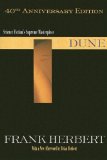Dune: a review
¶ by Rob Friesel
I think it’s very easy to have mixed (but very strong) feelings about Dune. Thus follows two reviews in one 1:
Fawning: (“It’s a science fiction classic!”) ★★★★★
On the back of the edition in my library is a quote from Arthur C. Clarke:
“Unique… I know of nothing comparable to it except The Lord of the Rings.”
Indeed, there seems to be nothing else in the science fiction corpus quite like Dune. An epic in every sense of the word–a scope so vast and a background so rich that Frank Herbert felt it necessary to give us a glossary and a series of appendices. The text is rife with all manner of allusions, riddled with sub-plots and suggestions and intimations of a profound and magnificent history (both real and imagined) of which we will receive only a taste. And through it all, the riveting tale of Paul-Muad’Dib Atreides–the messianic figure whose journey into the echelons of manhood and leadership propels us headlong through this fascinating universe.
And coming into this story for the first time in 2010–some 45 years after its initial publication–you can quickly and easily see how it has influenced so much of what came after it. Reading it, I was struck by how much it reminded me of so many of my favorite science fiction milieus from over the years. The feuding noble houses reminded me instantly of the BattleTech franchise–the Succession Wars and the complex alliances and rivalries 2. The demi-medievalism brought to mind images from Star Wars–an empire with all of its pageantry, right down to the glamour of fencing. The ecological concerns suggest the work of Margaret Atwood or Ben Bova–what with all of the world-making and unmaking and the lens that shows how the world makes the men, even as the men make the world. And subtle hints in the galaxy-spanning religiousness that bring to mind Hyperion and A Fire Upon The Deep
–the consecrated orders 3 and incantations and mythology and an ear toward histories ancient and unknowable.
And in so many ways, this is the science fiction fan’s perfect vision of escapist literature. The rise of a mighty warrior in a legendary high-stakes saga where his will is put to the test by insurmountable foes and yet he emerges triumphant.
But then let down: (“Perhaps epic in scope but…”) ★★★☆☆
But perhaps that’s just it. Even if the novel withstands the test after forty-five years and remains as canon Epic Sci-Fi; and even if you acknowledge the strength of its influence on Everything That Came Afterward; and even if you agree with these points and think favorably of the novel (as I do) you might also find that you’d wished it was more… complex? subtle? nuanced? For all the dramatic tension, there is never any doubt of how things will end. There is never any question–not even from that first chapter–that Paul Atreides will (despite his earliest assertions to the contrary) come to wear the mantle of the Kwisatz Haderach, that he will become the mythical Lisan Al-Gaib. Even when fate is testing him, you can sense that the tragedies are more for your benefit as the reader than they are formative experiences for Paul; there is an armature of a plot with the young hero’s arrival, with the tragic events that plummet him into his questing and wandering, and with the climactic reversal that leads to his messianic ascendance. But through all of these trials and tribulations, Paul is always so… confident–there is never a moment’s doubt from him. He is a classic übermensch–pre-destined to greatness and he knows it and even when he denies it, he is still wrapped up in the mythology that surrounds him. And as a consequence… Paul is almost boring. Constantly tapping into his latent prescience to tell us what will happen next (and being right); constantly getting embroiled in hand-to-hand combat and winning; constantly inspiring the men and women around him to rally to his cause… Even when there is dissent, the dissent is in his favor–the Fremen challenging him to challenge Stilgar for command of the tribes 4.
And that is just the bits about Paul–that is not even to attempt to dissect what goes on there w/r/t/ the class system, or women and other issues of gender and sexuality.
But… and there’s that but again: but it is an enjoyable read and one that is fantastically imaginative and fully-realized. It has earned a lasting place in the science fiction corpus with good reason–and I am actually a little happy that it took me so long to get around to this one.
- With minor spoiler alerts![↩]
- The combatants are even referred to as “Houses”.[↩]
- Monastic or merely apparently so.[↩]
- And of course, this too ends just as we would predict.[↩]
Leave a Reply